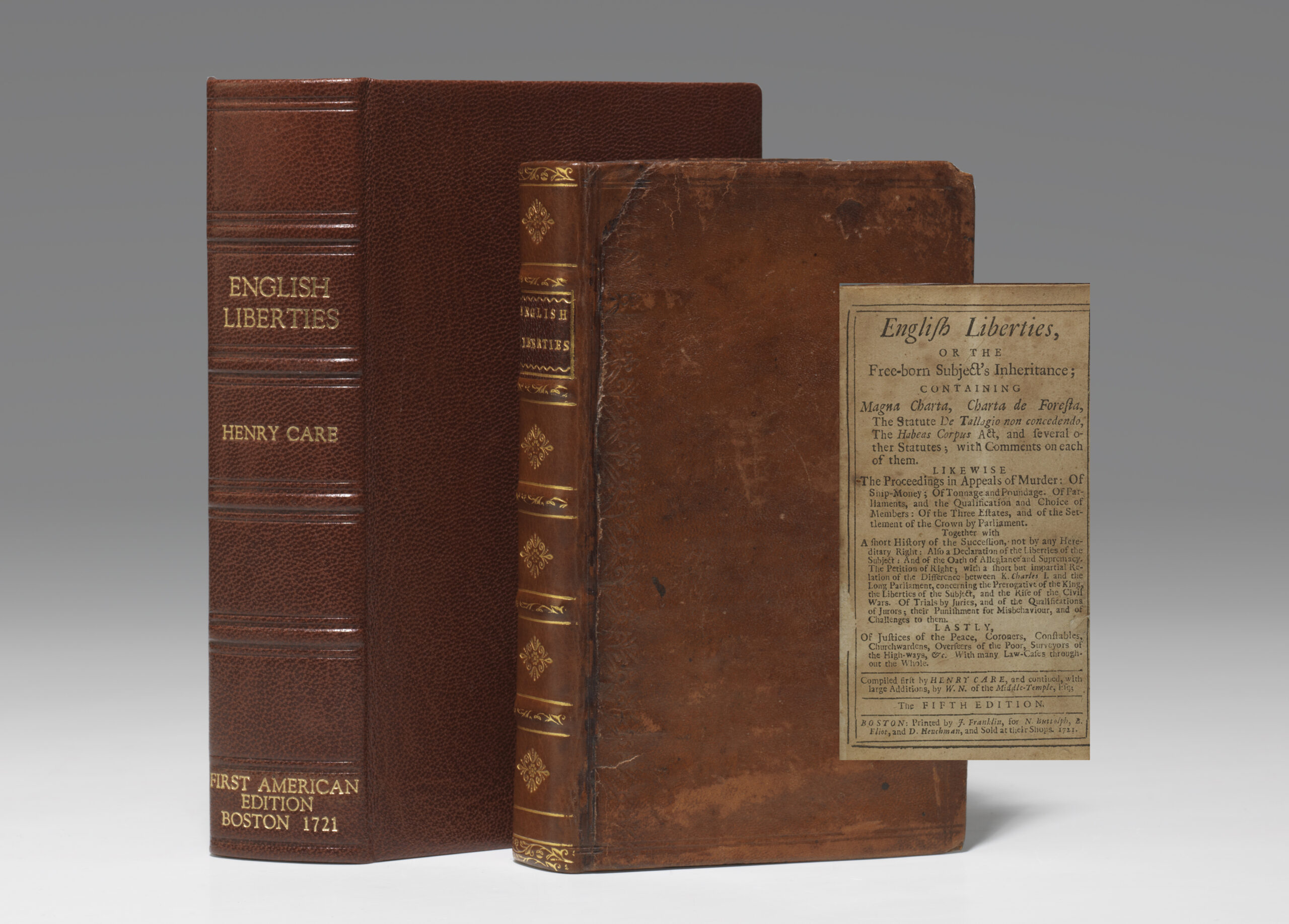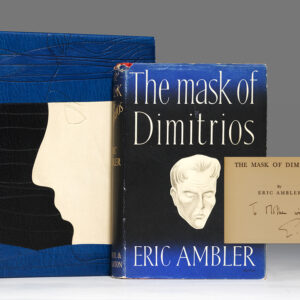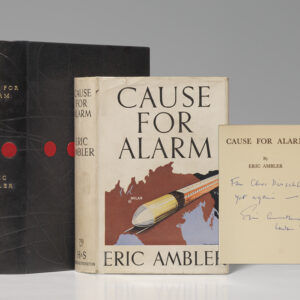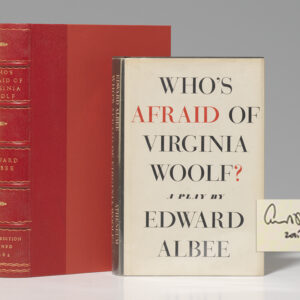Description
“ONE OF THE CENTRAL DOCUMENTS IN THE HISTORY OF WESTERN CIVILIZATION… THE SYMBOL OF POLITICAL LIBERTY”: EXCEEDINGLY RARE FIRST AMERICAN EDITION OF ENGLISH LIBERTIES, 1721, WHICH “HAD MORE TO DO WITH PREPARING THE MINDS OF AMERICAN COLONISTS FOR THE AMERICAN REVOLUTION THAN… COKE, SIDNEY AND LOCKE,” WITH ONE OF THE EARLIEST AMERICAN PRINTINGS OF THE MAGNA CARTA, PRINTED BY THE FIRM OF 15-YEAR-OLD APPRENTICE BENJAMIN FRANKLIN
CARE, Henry. English Liberties, or The Free-Born Subject’s Inheritance: Containing Magna Charta, Charta De Foresta… and Several Other Statutes. Boston: Printed by J. Franklin, for N. Buttolph, B. Eliot, and D. Henchman, 1721. Small octavo (4 by 6-1/2 inches), contemporary full brown sheep rebacked in calf gilt, red morocco spine label, raised bands.
First American edition, containing the first widely disseminated printing of the Magna Carta in America (preceded only by a 1687 appearance in a rarely found pamphlet), with a young Benjamin Franklin, apprenticed at his half-brother’s Boston firm, said to have aided in the printing of this exceedingly rare edition. To many, this edition of English Liberties, designed to “slip into one’s pocket… had more to do with preparing the minds of American colonists for the American Revolution than the larger but less accessible works of Coke, Sidney and Locke” (Hudson, 580-85). Care’s influence is clear “in the writings of the founding fathers of the United States—Samuel Adams, John Adams, John Dickinson and Alexander Hamilton… Jefferson added two copies of English Liberties to his library and arranged that it be included in the library of the University of Virginia” (Schwoerer, 231-5), very scarce in contemporary sheep.
Legend has it that a young Benjamin Franklin aided in the printing of this very rare first American edition of Care’s English Liberties, containing the first widely disseminated printing of the Magna Carta in America (preceded only by a 1687 appearance in a rarely found pamphlet). In 1718 at the age of 12, Benjamin Franklin was apprenticed to his half-brother James, a Boston printer who three years later would launch the New England Courant, the “only truly independent newspaper in the colonies.” At 15, Benjamin Franklin was working in James Franklin’s busy print shop setting type and running off sheets as the firm printed this first American edition of English Liberties. “It is quite probable that Benjamin Franklin worked on [this] edition” (Church 880), and English Liberties might well have been among those included when “the precocious young teen devised for himself a self-improvement course” (Isaacson, 21-8).
To many this Boston edition, designed to “slip into one’s pocket… had more to do with preparing the minds of American colonists for the American Revolution than the larger but less accessible works of Coke, Sidney and Locke” (Hudson, William Penn’s English Liberties, 580-85). Care intended English Liberties, first issued in England in 1680, “to provide uneducated and inexperienced English persons with documents and information about the law and their rights… praising England’s ‘fundamental laws [as] coeval with government’ and describing the Magna Charta as ‘Declaratory of the principal grounds of the Fundamental Laws and Liberties of England.’ Celebrating law in another piece as second only to the gospel, he described it in English Liberties as ‘the Best Birthright the Subject hath… Care regarded the essence of this birthright as the ‘privilege not to be exempt from the law of the land, but to be freed in Person and Estate from Arbitrary Violence and Oppression” (Morrison & Zook, Revolutionary Currents, 46-7).
English Liberties had a “longer and more significant reach in the American colonies… It played an important role in spreading concepts about English law, history, government, liberties and especially juries… Colonists found in Care’s English Liberties support of their views about the Saxons, Magna Charta as a reaffirmation of old laws guaranteeing the rights of all freemen, and ways to protect themselves against oppression… Care’s vocabulary and ideas appeared in the writings of the founding fathers of the United States—Samuel Adams, John Adams, John Dickinson and Alexander Hamilton. In their speeches and writings may be found exactly the same language that Care used in English Liberties when he praised the ‘two main pillars of the British Constitution,’ identifying those pillars as parliament and trial by jury… Americans started with Care’s statement that the ‘two Grand Pillars’ of an Englishman’s birthright shone ‘most conspicuously in Parliament and juries’ and reasoned from it that since the Constitution was ‘founded in the Common Rights of Mankind,’ and since the ‘Rights of Nature’ were ‘happily interwoven’ in its ‘ancient fabrick,’ the right to parliament and juries was ‘properly the birthright of free men everywhere… Care’s ideas, like those of William Penn and John Locke, which they profoundly resemble, were ahead of their time… William Penn silently lifted a sizable portion of English Liberties… into his Excellent Priviledge [sic] of Liberty and Property, which was printed in Philadelphia in 1687… The Library Company of Philadelphia, founded in 1731 by Franklin, acquired the 1719 [English] edition of English Liberties in 1764… Jefferson added two copies of English Liberties to his library and arranged that it be included in the library of the University of Virginia” (Schwoerer, Ingenious Mr. Henry Care, 231-5). Uncorrected mispagination as issued: 176 misnumbered 761; 216 misnumbered 116. Church 880. Evans 2208. Harvard Law Catalogue, 334. Sabin 10819. Sweet & Maxwell I:154-55. ESTC W31880. Viorst, Great Documents of Western Civilization, 112. See Miller xvii-xviii; Bronner & Fraser 76; Sowerby III:2702, 2703. Early owner inscriptions of members of the Blake family: successively dated 1740, 1750, 1768, and 1794.
Text fresh and crisp, title page backed with paper. Scarce and important.



